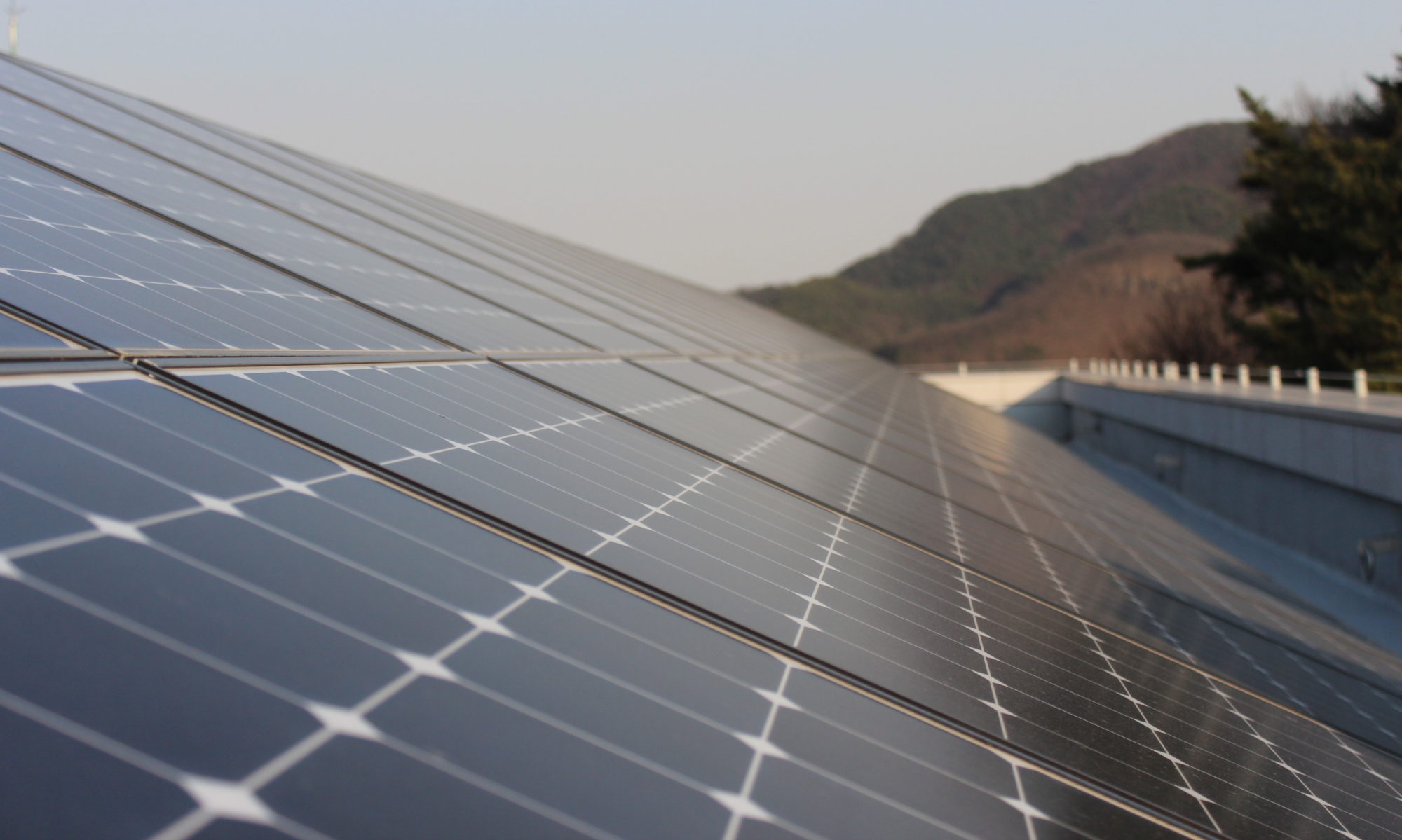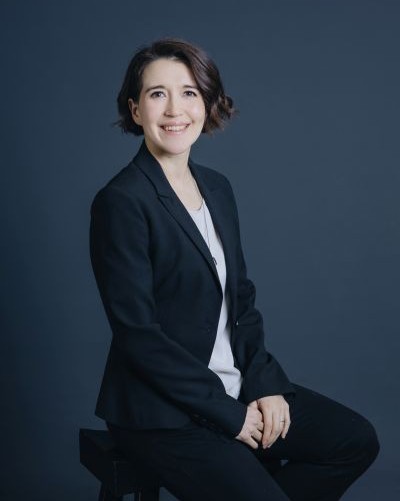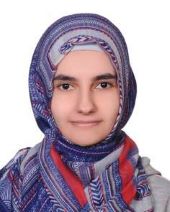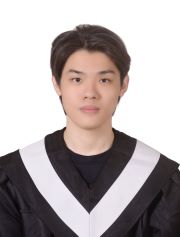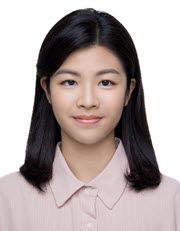Joseph Allen, F. Selin Bagci, Katherine A. Kim, Megan K Hofmann, and Kristen L. Dorsey, “A Feedback-Controlled Jamming Approach for Variable-Stiffness Actuators in Untethered Soft Robots” April 23-26, 2025, Lausanne, Switzerland.
IEEE Conference: APEC 2025
Sean Logi, F. Selin Bagci and Katherine A. Kim, “Design and Evaluation of Flexible Inductors for Wearable Power Electronics,” IEEE Applied Power Electronics Conference and Exposition (APEC), Atlanta, GA, USA, 2025. (IEEE Xplore link coming soon)
Prof. Katherine A. Kim (김예린,金藝璘)
Prof. Katherine A. Kim received the B.S. degree in electrical and computer engineering from Franklin W. Olin College of Engineering, Needham, MA, in 2007. She received the M.S. and Ph.D. degrees in electrical and computer engineering from the University of Illinois, Urbana-Champaign, IL, USA, in 2011 and 2014, respectively. In 2014, she started as an Assistant Professor of Electrical and Computer Engineering at the Ulsan National Institute of Science and Technology (UNIST), Ulsan, South Korea. Since 2019, she has been with National Taiwan University, Taipei, Taiwan, where she is currently a Professor of Electrical Engineering.
Prof. Kim’s research focuses on power electronics and control for solar photovoltaic applications. She received the Mac Van Valkenburg Early Career Teaching Award from the IEEE Education Society in 2024, the Award for Achievements in Power Electronics Education from the IEEE Power Electronics Society (PELS) in 2022, recognition as an Innovator Under 35 for the Asia Pacific Region by the MIT Technology Review in 2020, and the Richard M. Bass Outstanding Young Power Electronics Engineer Award from PELS in 2019.
She has served as an Associate Editor for IEEE Transactions on Power Electronics from 2027-2024. For IEEE PELS, she served as the Student Membership Chair in 2013-2014, PELS Member-At-Large for 2016-2018, PELS Women in Engineering Chair in 2018-2020, and the PELS Constitution and Bylaws Chair in 2021-2023. She is currently the IEEE PELS Vice President of Global Relations for 2024-2025.
Note: Prof. Kim is not accepting any new requests for talks or committee positions throughout the rest of 2025.
ORCID: 0000-0001-9144-1001
Selin Bagci – Ph.D.
Selin Bagci received the B.S. degree in Electrical and Computer Engineering in 2018 from Ulsan National Institute of Science and Technology (UNIST), South Korea. She received the M.S. in Electrical Engineering in 2020 from National Taiwan University of Science and Technology (NTUST), Taiwan. She received her Ph.D. degree in Electrical Engineering at National Taiwan University, Taiwan, in 2025. Her research interests are in dc-dc converter development and control for photovoltaic energy harvesting applications.
Papers:
Lab Flight Emissions for 2024 and Tree Planting Offsets
The PEARS lab has begun to track CO2 emissions for conference-related travel of the lab members. Here are some statistics for 2024:
- Took 6 trips to attend conferences
- In total, 7 lab members attended conferences
- Locations: 2 in North America, 1 in Europe, 3 in Asia
- Estimated CO2 emissions: 29.9 tons
Attending conferences is very valuable to our lab members, but we recognized that each flight has nonnegligible climate-changing emissions. To mitigate emissions, we target conferences in Asia or with virtual options. Additionally, Prof. Katherine Kim personally purchases a tree-planting certificate to offset some of the emission from lab-related travel. To offset the emissions from 2024, a certificate for planting 500 trees was purchased through Ecosia (certificate shown below). The PEARS Lab is committed to reducing emission from our activities and operations while conducting high-quality research on power electronics for a sustainable future.

Ph.D. Defense for Selin Bagci
On January 17, 2025, Ph.D. Student Selin Bagci successfully defended her doctoral dissertation on “Flexible Solar Energy Harvesting and Fabric-Based Circuits: A Framework for Wearable Power Electronics.” The group picture from the doctoral defense is pictured below.
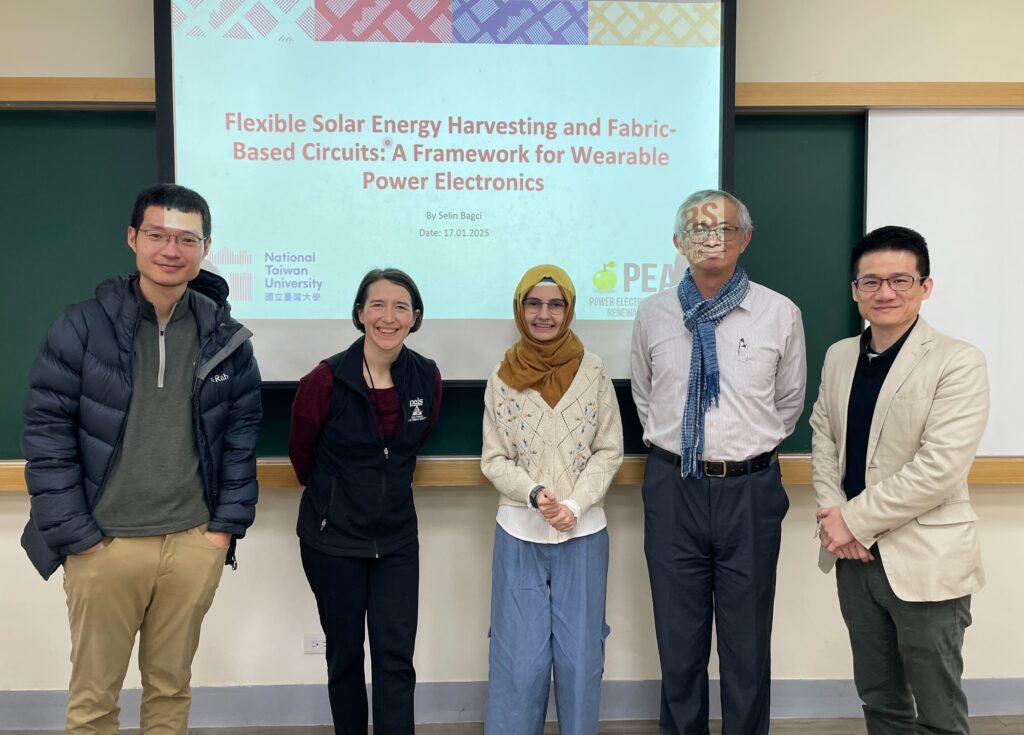
Throughout her graduate studies, Selin (soon to be Dr. Bagci) has become an expert on designing, developing, and evaluating power electronics for wearable applications with a particular focus on solar photovoltaic energy harvesting and circuit implementation on fabric substrates. She has authored/co-authored many academic papers on these topics, which can be found on the Publications page.
Journal Publication: IEEE Transactions on Power Electronics
Lien-Chieh Chen, F. Selin Bagci, and Katherine A. Kim, “An Improved Photovoltaic Differential Power Processing System Using Bidirectional Boost-Type Converters With Synchronous Switching,” IEEE Transactions on Power Electronics, vol. 39, no. 12, pp. 16720-16730, Dec. 2024, doi: 10.1109/TPEL.2024.3438116. (IEEE Xplore Link).
PFC Boost Converter Simulation Resources
These are resources for the article “Simulation Technique and Mathematical Basis for Faster AC Analysis of Power Factor Correction Boost Converters” by Katherine A. Kim and Thomas G. Wilson Jr., published in IEEE Access.
SIMPLIS File Download
These files output the AC analysis (frequency response) for the control loop, input impedance, and output impedance of a PFC boost converter. Simulations are provided for both an AC voltage source and a DC voltage source to the PFC boost converter. The DC voltage source simulates much faster and gives almost the same results as the AC source for the control loop and output impedance measurements, but not the input impedance. In short, the DC source should NOT be used to measure input impedance , but the file is provided here as a reference. Files are ready to run.
Control Loop with AC Source: ControlLoop_AC_KimLin_20240403.sxsch
Control Loop with DC Source: ControlLoop_DC_KimLin_20240403.sxsch
Input Impedance with AC Source: Zin_AC_KimLin_20240403.sxsch
Input Impedance with DC Source: Zin_DC_KimLin_20240403.sxsch
Output Impedance with AC Source: Zout_AC_KimLin_20240403.sxsch
Output Impedance with DC Source: Zout_DC_KimLin_20240403.sxsch
Matlab Figure File Download
These are the Matlab Figure files for the generated graphs used in the paper. Please refer to the paper for the descriptions. Six Matlab .fig files are included in the .zip file below.
Figure2.fig
Figure3.fig
Figure4.fig
Figure7.fig
Figure9.fig
Figure12.fig
Citation Information
If you use the above files or utilize knowledge from the article, please cite our work!
Citation (IEEE format):
Katherine A. Kim and Thomas G. Wilson Jr., “Simulation Technique and Mathematical Basis for Faster AC Analysis of Power Factor Correction Boost Converters,” IEEE Access, vol. 12, pp. 165130-165142, 2024, doi: 10.1109/ACCESS.2024.3491299.
Journal Publication: IEEE Access
Katherine A. Kim and Thomas G. Wilson Jr., “Simulation Technique and Mathematical Basis for Faster AC Analysis of Power Factor Correction Boost Converters,” IEEE Access, vol. 12, pp. 165130-165142, 2024, doi: 10.1109/ACCESS.2024.3491299. (IEEE Xplore Link)
PEARS Lab Attends ECCE 2024
Prof. Katherine Kim and undergraduate intern Kai En Loo attended IEEE Energy Conversion Conference and Expo (ECCE) 2024 held in Phoenix, AZ, USA.
During the IEEE Power Electronics Society (PELS) Town Hall meeting on October 20, 2024, Prof. Kim presented an update on the recent educational activities of PELS. There are many educational activities for IEEE PELS members, ranging from students to professionals, including webinars, podcasts, student competitions, an educational video series (PELSTube), ‘PhD Schools,’ and university power electronics kits. After, she participated in an open panel discussion as the PELS Vice President for Global Relations (and Educational Activities). A picture of the panel is below.
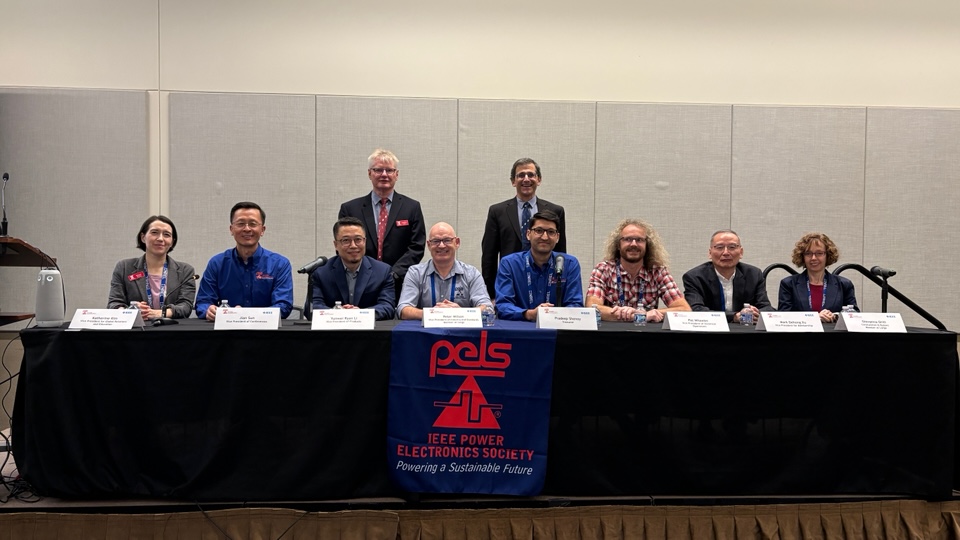
During the poster presentation on October 21, 2024, Kai En presented his poster on “Photovoltaic Array Mismatch Analysis for Differential Power Processing Systems Using Real-World Data,” as shown in the picture below. He talked to many people at the conference explaining how his work utilized real-world data to investigate differences among channels in solar PV panels to better understand the requirements for differential power processing converters.

Conference Publication: ECCE 2024
Kai En Loo and Katherine A. Kim, “Photovoltaic Array Mismatch Analysis for Differential Power Processing Systems Using Real-World Data” IEEE Energy Conversion Congress and Expo (ECCE), Phoenix, AZ, USA, 2024, pp. 86-92, doi: 10.1109/ECCE55643.2024.10861287. (IEEE Xplore Link)
Magazine Article: IEEE Power Electronics Magazine
Katherine A. Kim, Arshiah Yusuf Mirza, Sneha Narasimhan, Stephanie Watts Butler, Marium Rasheed, and Lauren E. Kegley, “Women in IEEE PELS: Progress and Opportunities in 2024,” IEEE Power Electronics Magazine, vol. 11, no. 3, pp. 96-103, Sept. 2024, doi: 10.1109/MPEL.2024.3440692. (IEEE Xplore Link)
Prof. Kim Receives the Mac Van Valkenburg Early Career Teaching Award at FIE 2024
Prof. Katherine Kim attended the Frontiers in Education (FIE) 2024 conference in Washington DC, USA, October 13-16, 2024. During the conference, Prof. Kim served as a Session Chair for “T101: DEI for STEM Faculty” on October 15, 2024, learning about various types of educational research studies. While at FIE 2024, Prof. Kim was overjoyed to reconnect with professors and students from Olin College, her Alma Mater.
During the Awards Luncheon on October 15, 2024, Prof. Kim received the 2024 Mac Van Valkenburg Early Career Teaching Award from the IEEE Education Society, ‘For innovative teaching methods to foster interactive student experiences and inclusive learning environments.‘ She was honored to be one of the IEEE Education Society Awardees for 2024, as shown in the picture below.
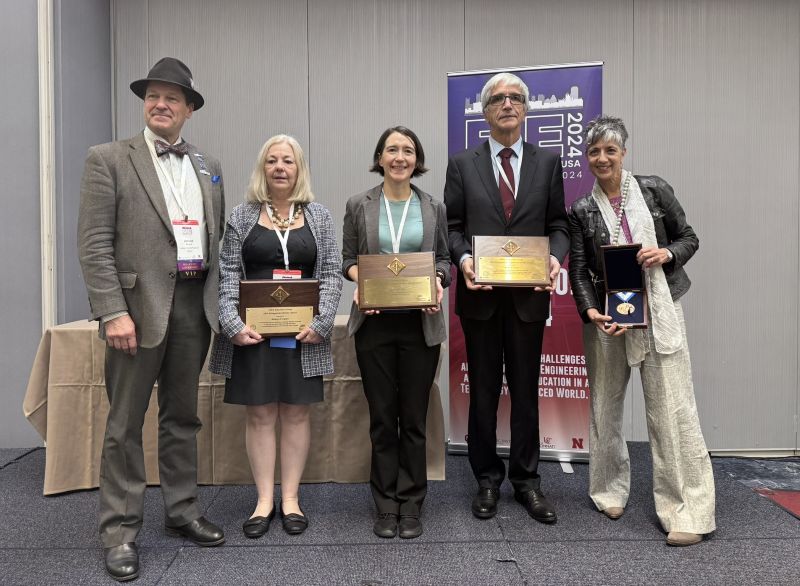
Journal Publication: IEEE Transactions on Education
Katherine A. Kim, F. Selin Bagci, and Anwell Ho, “Using a Partially Flipped Classroom and Gamification to Improve Student Performance in a First-Year Electronic Circuits Course,” IEEE Transactions on Education, vol. 67, no. 5, pp. 758-766, Oct. 2024, doi: 10.1109/TE.2024.3422017. (IEEE Xplore Link)
Prof. Kim Receives the 2024 Ta-You Wu Memorial Award
Prof. Katherine Kim was awarded the 2024 Ta-You Wu Memorial Award (113 年度吳大猷先生紀念獎) from the Taiwan National Science and Technology Council (NSTC). Prof. Kim was presented the award on September 27, 2024, by the President of National Taiwan University, Dr. Wen-Chang Chen, as shown below.
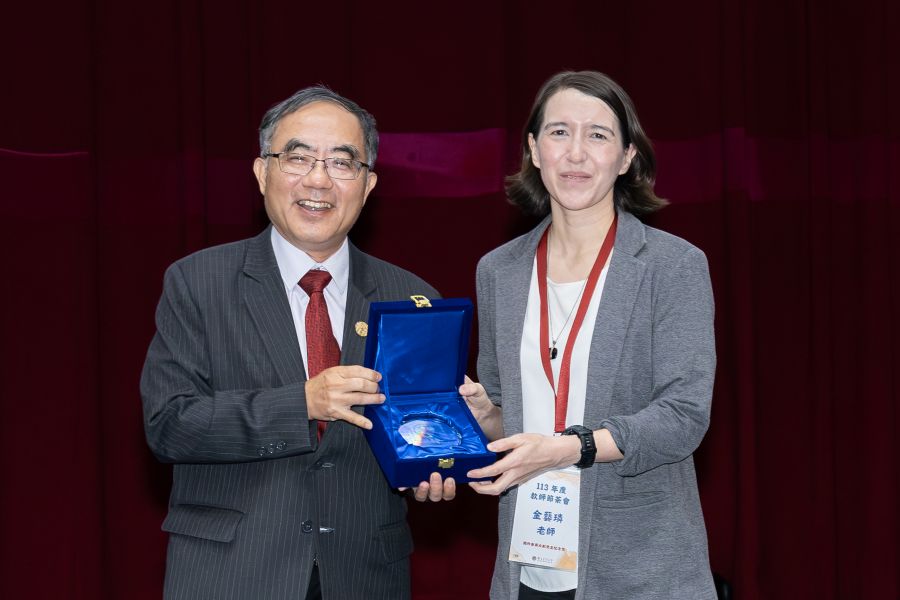
Prof. Kim was honored to receive such a prestigious recognition and plans to continue making strides in research to achieve a clean and sustainable future worldwide.
Prof. Kim Attends FEPPCON 2024
Prof. Katherine Kim attended the Future of Electronic Power Processing and Conversion (FEPPCON) 2024 conference held in Geneve, Switzerland. She was invited to participate in Session 7 on “Workforce Development: Empowering the Next Generation,” organized by Dr. Christina DiMarino and Dr. Chris Mi (see image below). During the session, Prof. Kim gave a presentation entitled “Embracing Diversity: Exploring Educational Approaches for Inclusive Learning Environments” and also moderated the panel session that followed.
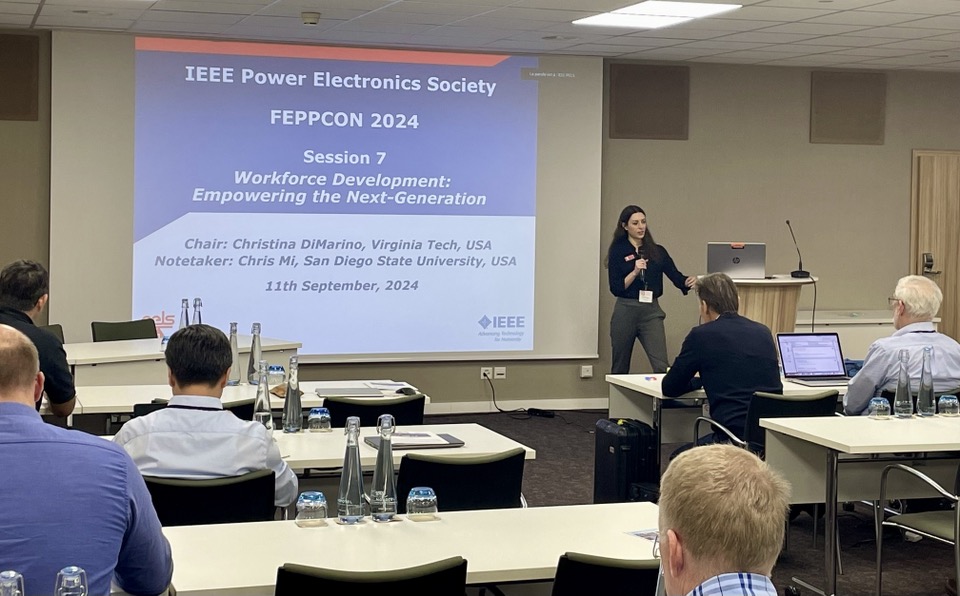
During the forum, the participants also took a tour of the European Organization for Nuclear Research (CERN) to learn how power electronics is a vital part of making and running the Large Hadron Collider (LHC) at CERN. Prof. Kim loved the tour of the various facilities at CERN (see image below).
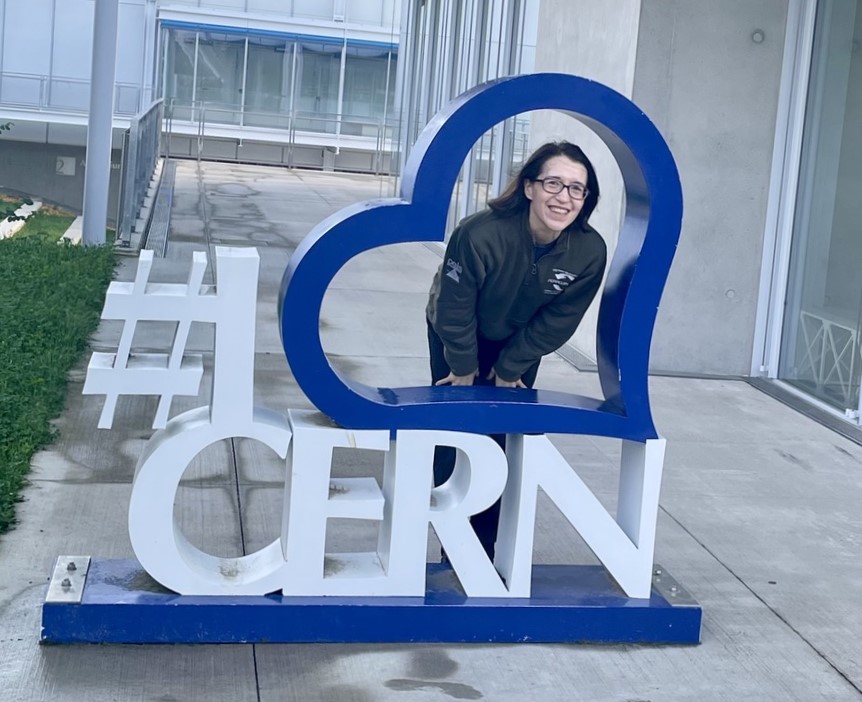
Kai En Loo (羅凱恩) – Undergraduate Intern Student
Kai En Loo is a senior student at National Taiwan University (NTU) in the Electrical Engineering Department. He plans to pursue a master’s degree at NTU with the PEARS Lab. His research interests include energy conversion, particularly in renewable systems.
Papers:
Jui Yang Tsai (蔡瑞洋) – M.S. Student
Jui Yang Tsai received a B.S. degree in Electric Engineering from the National Chung Hsing University, Taichung, Taiwan, in 2024. He is pursuing a M.S. degree in Electrical Engineering at National Taiwan University, Taipei, Taiwan. His major research interest is in power converters.
To-Lei Huang (黃朵蕾) – M.S. Student
To-Lei Huang is a M.S. student at National Taiwan University (NTU) in the Electrical Engineering Department. Her research interests are offshore wind power systems and power conversion. She also has interests in ballroom dancing and K-pop.
Papers:
Jiann-Yeu Ju (朱健瑀) – M.S. Student
Jiann-Yeu Ju received a B.S. degree in Electric Engineering from the National Taiwan University of Science and Technology (NTUST) in 2024. He is a Master’s student in the Electrical Engineering Department at National Taiwan University.
